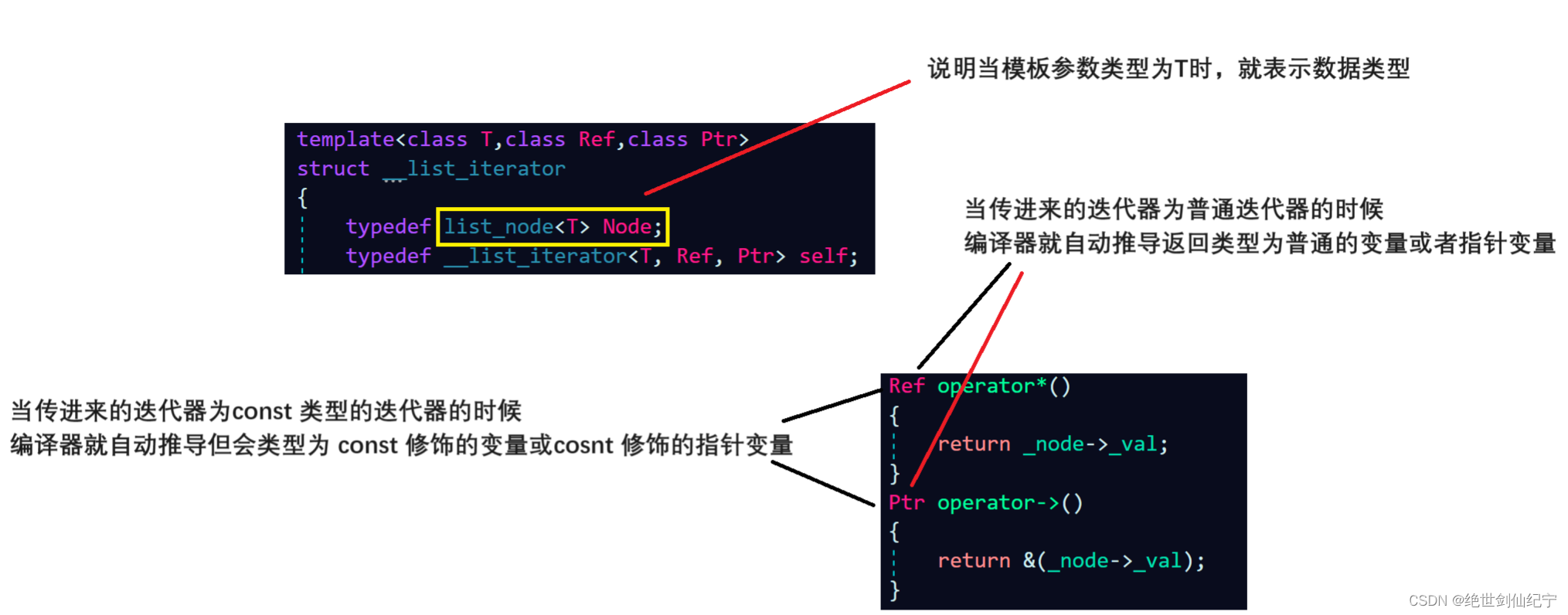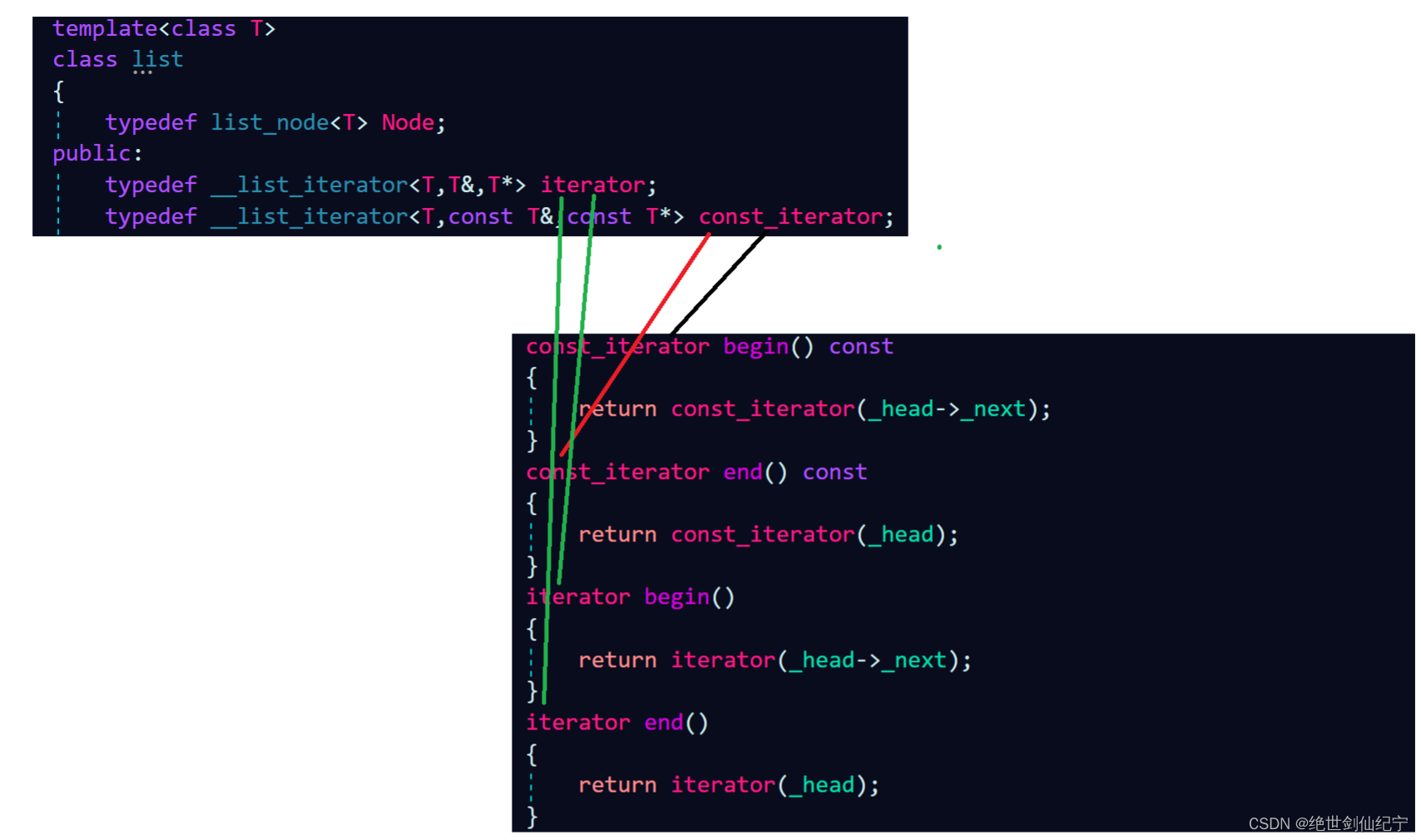简易实现 STL--list
实现 list 的主要思想及过程
首先,实现过程中的所有代码必须放在自己定义的命名空间中。
定义一个结点的结构体类模板,结点的数据类型就应该是模板类型 T,定义的 next指针和 prev指针都应该是模板指针类型,并且结构体类中药有构造函数,确保在 new 结点的时候,不会出现未初始化的情况。
第二步就是定义一个迭代器的类模板,其中模板参数要有三个,分别做数据类型和返回值类型,保证普通迭代器和 const 类型的迭代器都能通用,在泛型编程下,只要保证模板参数的数量足够,编译器就能自动推导需要的数据类型!

最后一步就是写出 list 的类模板,这个其实只需要传一个模板参数即可,在使用迭代器的时候,使用迭代器自己实例化的模板参数来自动推导即可。

因为list 在使用迭代器的时候只需要控制普通迭代器和 const 迭代器的返回类型即可,所以只需要两种不同模板参数的迭代器区分返回值即可。
#include<iostream>
using namespace std;
namespace zyb
{
template<class T>
struct list_node
{
T _val;
list_node<T>* _next;
list_node<T>* _prev;
list_node(const T& x = T())
:_val(x),
_next(nullptr),
_prev(nullptr)
{}
};
template<class T,class Ref,class Ptr>
struct __list_iterator
{
typedef list_node<T> Node;
typedef __list_iterator<T, Ref, Ptr> self;
Node* _node;
__list_iterator(Node* node)
:_node(node)
{
}
self operator++(int)
{
self tmp = __list_iterator(_node);
_node = _node->_next;
return tmp;
}
self operator--(int)
{
self tmp = __list_iterator(_node);
_node = _node->_prev;
return tmp;
}
self& operator++()
{
_node = _node->_next;
return *this;
}
self& operator--()
{
_node = _node->_prev;
return *this;
}
bool operator==(const self& it)
{
return it._node == _node;
}
bool operator!=(const self& it)
{
return it._node != _node;
}
Ref operator*()
{
return _node->_val;
}
Ptr operator->()
{
return &(_node->_val);
}
};
}泛型编程中模板的再理解?
过程中学习到的一些模板的知识:如何自己实现一个函数,可以打印不同容器中不同的数据类型?
这是实现 list 的不同数据打印的代码,值得注意的是,在 list<T> 前面加了一个 typename? ,包括前面的模板声明,也用的是 typename 这是为什么呢?
如果不加 typename ,因为?list<T>? 就是未实例化的模板,因为类型是不确定的,里面会有好多未确认的类型,并且编译器无法辨别 const_iterator 是 内嵌类型 还是 静态成员变量(只有内嵌类型和静态成员变量才能通过类域去访问),编译器就会报错;那么前面加一个 typename,就相当于一个给编译器的声明,这是一个内嵌类型(保证编译的时候不会报错),等 list<T> 实例化之后,再去对应的类里找到实例化类型来替换。
template<typename T>
void print_list(const list<T>& lt)
{
typename list<T>::const_iterator it1 = lt.begin();
while (it1 != lt.end())
{
cout << *it1 << ' ';
++it1;
}
cout << endl;
for (auto e : lt)
{
cout << e << ' ';
}
}当然,也可以改写为一个针对全部容器打印数据的代码,
Container 的类型根据传入的容器类型来推导出来,相当于对于上面的模板再抽象了一层。
这就是泛型编程!
template<typename Container>
void print_container(const Container& x)
{
typename Container::const_iterator it1 = x.begin();
while (it1 != x.end())
{
cout << *it1 << ' ';
++it1;
}
cout << endl;
for (auto e : x)
{
cout << e << ' ';
}
}本文来自互联网用户投稿,该文观点仅代表作者本人,不代表本站立场。本站仅提供信息存储空间服务,不拥有所有权,不承担相关法律责任。 如若内容造成侵权/违法违规/事实不符,请联系我的编程经验分享网邮箱:veading@qq.com进行投诉反馈,一经查实,立即删除!